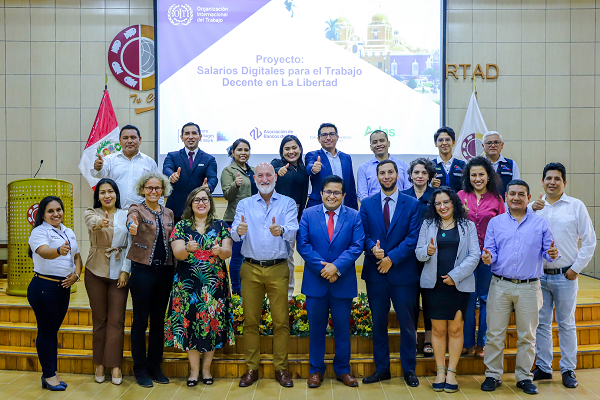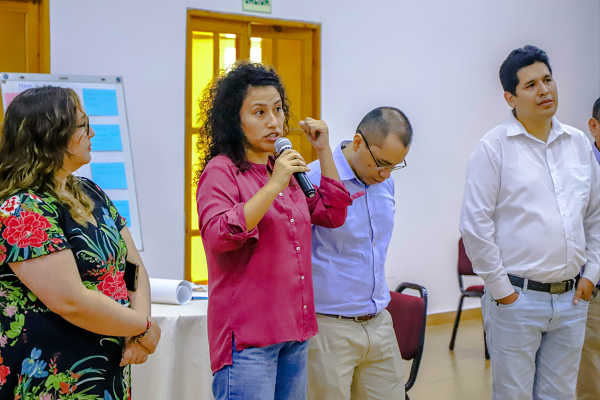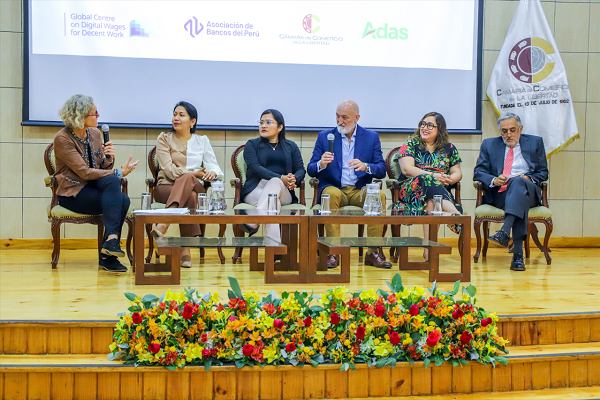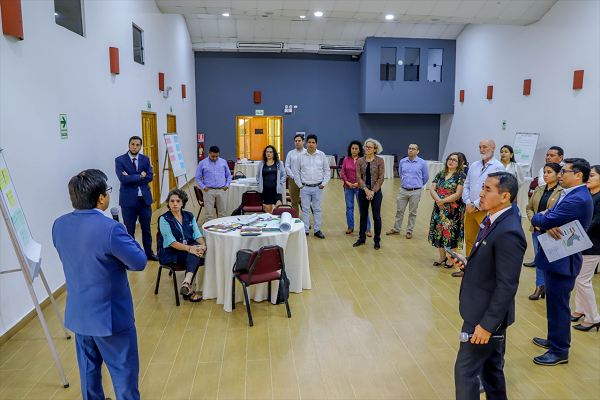Contact us: digitalwages@ilo.org
Peru’s agro-export sector promotes responsible digital wage payments in the La Libertad region | Sector agroexportador peruano promueve el pago digital de salarios en la región La Libertad

Lea el artículo en español aquí.
On August 29, 2023, in the city of Trujillo, the first awareness raising workshop for local stakeholders was held to promote the responsible payment of digital wages, i.e., the payment of wages in bank accounts or electronic wallets. The event was attended by representatives of government entities, financial institutions, enterprises in the agro-export sector, financial system regulator and non-for-profit organization. Participants made a joint reflection to identify priority actions to promote responsible digital wage payments in enterprises in the agro-export industry and their service providers. This workshop was conducted by the ILO’s Global Centre on Digital Wages for Decent Work in partnership with the Association of Banks of Peru (ASBANC), the Chamber of Commerce and Production of La Libertad and the Association for Sustainable Agricultural Development (ADAS).
During the first half of 2023, in La Libertad, agribusiness has generated 115,000 direct, indirect and induced jobs, thanks to the demand for labour for processing and exporting superfoods such as grapes, avocados, mangoes, blueberries, etc.

Workers in export enterprises typically receive wages in bank accounts, but do not always fully benefit from financial inclusion, due to the limited financial infrastructure in their communities, mistrust of financial institutions and weak digital and financial education, among others.
Three out of ten workers in formal enterprises still receive wages in cash
Data from the Ministry of Labour and Employment Promotion reveal that, in March 2023, 30 per cent (74,000) of formal workers in the private sector in La Libertad received wages in cash. Activities related to agro-exports, such as commerce, restaurants and hotels, and transportation and storage, concentrated more than 9,600 workers who received cash wages in MSMEs. The payment of wages in cash predominates mainly among women, adults 25 years of age and older, and workers with incomes below the minimum living wage (US$277). Moreover, cash wage payments are likely to be prevalent in the informal enterprises in the region. Given the dynamism of the agro-export sector, there is a huge potential multiplier effect of promoting responsible digital wages for workers in exporting enterprises, as well as for the multitude of service providers in their supply chain.
Promoting responsible digital wage payments is needed to accelerate greater financial inclusion and formalization in La Libertad
Workshop participants agreed on the need to promote the initiative to encourage the payment of digital wages, seen as an “access key” for formality, business development, and financial inclusion.
For the representative of the Association of Microfinance Institutions (ASOMIF) of Peru, promoting the digitization of wages favours a more advanced financial ecosystem and greater opportunities for business development. He added that digital payments allow enterprises and their workers to generate historical information of their financial movements, and consequently access more easily a loan or other financial products.

Likewise, the Regional Direction of Labour and Employment Promotion of La Libertad highlighted that formality allows SMEs to access new financial products and markets that provide them with higher profit margins. For his part, the representative of ASBANC pointed out as a key element for the digitalization of wages and formalization, the promotion of education on financial issues aimed at merchants, entrepreneurs, workers, heads of household, among other vulnerable groups, complemented with training on specific topics such as cybersecurity, data protection and proper use of digital tools of the financial system, to avoid fraud and / or scams. In that line, the representative of Pagos Digitales Peruanos (BIM) highlighted the importance of also addressing the issue of connectivity to take advantage of the benefits of digital tools and innovation for easy and quick access to the financial ecosystem.
Suggestions to accelerate the transition to responsible digital wage payments in La Libertad
Workshop participants identified key actions to facilitate the transition to responsible digital wage payments:
- Promote actions to raise awareness of enterprises and their workers on the benefits of formalization and digital wages.
- Strengthen the local financial ecosystem, the interoperability between financial institutions and e-wallets, and the regulatory framework; and ensure that financial services, including digital payments, respond to the needs of workers and SMEs to facilitate adoption and use and improve conditions for workers.
- Develop financial and digital education actions to strengthen the capacities of small entrepreneurs and their workers to make informed decisions about digital financial services and minimize risks of scams and fraud.
- Foster dialogue and partnerships between government actors, local business and worker associations, financial and telecommunication service providers to coordinate efforts towards digitization of SMEs and their payments and sustainable development of the agribusiness sector, in general.

United for the responsible digitization of wage payments
Representatives of the Regional Direction of Labour and Employment Promotion of La Libertad, ASBANC, ASOMIF, BIM, Caja Sullana, private agro-export enterprises, Trujillo Branch of Central Reserve Bank of Peru, La Libertad office of the National Institute of Statistics and Informatics, Chamber of Commerce and Production of La Libertad, ADAS and CEDEPAS North, agreed to carry out joint work and coordinated interventions to promote the responsible digital payments of wages.
